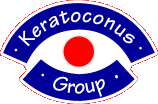University of Liverpool biomedical engineer, Dr Ahmed Abass, has been awarded funding from Fight for Sight and Keratoconus Group UK to develop a new type of spectacle lens that can correct irregular astigmatism for keratoconus patients.
The £15k funding award will support clinical validation of the technology with a view to developing it as a new clinical product.
Keratoconus is a disorder of the eye which results in progressive thinning of the cornea. This may result in blurry vision, double vision, near-sightedness, astigmatism, and light sensitivity. It is estimated to affect between one in 500 to 2,000 people worldwide with most cases of keratoconus become apparent during a person’s teens or early 20’s.
The condition causes distorted vision that cannot be corrected using current spectacle lens manufacturing techniques meaning that patients are entirely dependent on contact lenses or in serious cases, corneal transplants.
Dr Ahmed’s project will address the distorted vision with the development of spectacle lenses that can correct non-orthogonal astigmatism.
Dr Abass said: “We have already developed a proof of concept spectacle lens which can be used by kerataconic patients. This funding will be used to take forward the technology and to trial it in a clinical setting. This is an important next step and we hope the outcome of this project will be to take the technology forward as a clinical product, potentially leading to a major step forward in the current prescription system for patients.”
Chief Executive of Fight for Sight, Sherine Krause said: “We’re delighted to be funding this valuable research project, which could help bring forward the development of a new type of corrective spectacle for those living with keratoconus. We know that people with advanced keratoconus find difficulty in their daily life during the times when they cannot wear their contact lenses, so we look forward to seeing the results from Dr Ahmed’s clinical trial.”
The project also involves Dr Vito Romano, Consultant Ophthalmic Surgeon and Mr Andrew Tompkin, Head of Optometry who are with St. Paul’s Eye Unit, Royal Liverpool University Hospital.
Dr Ahmed has a track record of developing innovative solutions that can help keratoconus patients including a recent Knowledge Transfer Partnership with UltraVision which led to the development of a new generation of Kerasoft contact lenses for advanced keratoconus cases.
Knowledge Transfer Partnerships (KTPs) are a UK-wide Government funded programme which enables Higher Education Institutions to work with businesses to improve their competitiveness and productivity.
The University KTP Office offers a full range of services to support academics and companies from the initial enquiries through to the end of the partnership. For more information about KTP and case studies please visit https://www.liverpool.ac.uk/ktp


Hi
Any developments on this clinical trial that Dr Ahmed is carrying out ?
Thanks
Sorry, just seen this question. The trial has been delayed because of Covid so we do not expect to get any news for some time.
I am very interested in your work. I have Keratoconus and very high stigmatism I wear contact lenses and am under Ken Pullum at Moorfields City Rd London. Of late I find sometimes I cannot tolerate te lenses all day. I have now been wearing lenses for over 30 years, so would be very interested in hearing the progress of these spectacles. Thank you.
Many of us have this problem. We will not have any updates until the project is completed unless Liverpool University make an interim announcement. As soon as we get some news we will report it here.
Hi. If you need volunteers for this research I would be more than happy to participate
Lots of us would love to volunteer.
Dr Abass’ work was due to start by 1 October has been delayed. We will post updates when we get them.
How much funding did our charity provide for this project and were any conditions imposed with the offer of funding?
I would happily volunteer. I have advanced KC in both eyes with scaring. Wear scleral lenses but they are getting harder to tolerate. I await news.